BIGSSS Summer Schools Archive
In previous years BIGSSS organized summer schools on:
- 2022: Computational Social Sciences (Social Cohesion)
- 2019: Computational Social Sciences (Migration)
- 2018: Computational Social Sciences (Conflicts)
- 2018: Life Course
- 2017: Interest Group Politics
- 2017: Social Cohesion in a World of Increasing Diversity
- 2016: Intergroup Conflict and Its Resolution - the Case of Ukraine
- 2015: The Welfare State and Inequality
- 2014: Interventions
______________________________
3rd Computational Social Science Summer
July 4-15, 2022 | Groningen, The Netherlands | Topic: Social Cohesion | in cooperation with Volkswagen Foundation
The third BIGSSS-Computational Social Science Summer School finally took place in Groningen (The Netherlands). This time, the topic was social cohesion. Originally it was supposed to take place in 2020, but due to the Corona pandemic it had to be postponed several times.
36 junior and 17 international senior scientists from sociology, demography and computational methods discussed a variety of aspects of social cohesion and started their own projects applying computational methods on selected topics.
The summer school series follows the idea of a research incubator which brings together experts in computational social sciences (CSS), experts on the research topic in question, and junior researchers to advance future research on the topic by using data-driven modeling approaches. To implement this idea, this year's summer school again applied the successful concept of teaming up junior researchers with senior experts to work through the whole research process on one specific research topic.
Junior and senior scientists worked together in projects on the following topics:
- Cultural swarms of social cohesion
- Computational institutional analysis
- Organizational citizenship behavior: Dynamical reciprocity in giving and receiving help
- Predicting the trust radius with machine learning: To what extent are those “Most People” out-groups?
- Using Twitter to measure social cohesion and attitudes towards immigration
- Political Echo Chambers
- Simulating an empirically-calibrated, society-wide network and its intergroup cohesiveness
- Residential segregation and political polarization
- Down the rabbit hole: Polarization and information segregation on YouTube
- From survey data to coherence agents
The project work was complemented by lectures on theory and concepts of social cohesion as well as lectures and hands-on workshops on methods of computational social sciences. Keynote speeches were held by Miranda Lubbers (Autonomous University of Barcelona), Jochem Tolsma (University of Groningen & Raboud University Nijmegen), and Mako Hill (University of Washington). The summer school's program was rounded off with social events.
______________________________
2nd Computational Social Science Summer School
June 10 – 21, 2019 | Pula, Sardinia | Topic: Migration | in cooperation with Volkswagen Foundation
 The second BIGSSS-Computational Social Science Summer School on Migration took place in Pula on Sardinia (Italy). 25 junior and 13 international senior scientists from intercultural communication, urban studies, demography and complex systems discussed a variety of aspects of migration research and started their own projects applying computational methods on selected topics.
The second BIGSSS-Computational Social Science Summer School on Migration took place in Pula on Sardinia (Italy). 25 junior and 13 international senior scientists from intercultural communication, urban studies, demography and complex systems discussed a variety of aspects of migration research and started their own projects applying computational methods on selected topics.
The summer school series follows the idea of a research incubator which brings together experts in computational social sciences (CSS), experts on the research topic in question, and junior researchers to advance future research on the topic by using data-driven modeling approaches. To implement this idea, this year's summer school again applied the successful concept of teaming up junior researchers with senior experts to work through the whole research process on one specific research topic.
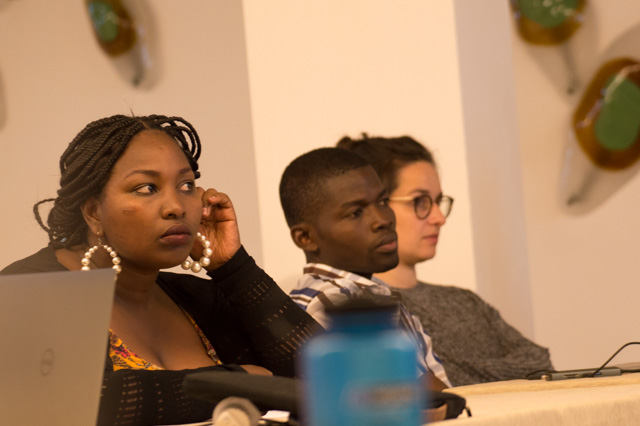 Junior and senior scientists worked together within the following projects:
Junior and senior scientists worked together within the following projects:
- Social integration and the Urban Form: Measuring immigrants integration through urban mobility patterns (Urban social integration)
- Behavioural Consequences of Group Threat – Ethnic Derogation on YouTube in the Aftermath of Threatening Events (Ethnic derogation)
- Analyzing the Social Integration of refugees through Text Analysis of Social media Data (Integration and social media)
- A test of the Schelling model of spatial segregation (Testing the Schelling model)
- Digital and computational approaches to study migration (Digital migration reserach)
- Global Migration Modelling with MIDAS (Global MIDAS)
- Migration Data Innovation for Evidence-Informed Policymaking (Migration Data Innovation)
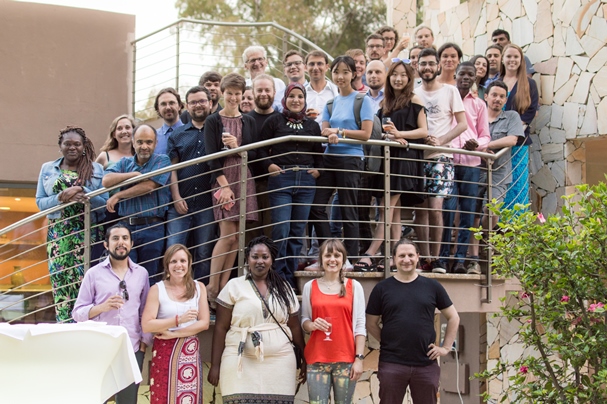 The project work was complemented by plenary lectures on theory, concepts and methods of migration research and computational social sciences methods. Keynote speeches were held by Marta Gonzalez (University of California Berkeley), Dirk Brockmann (Humboldt University Berlin), Emilio Zagheni (Max Planck Institute for Demographic Research), and George Barnett (University of California, Davis). The summer school's program was rounded off with social events such as a guided city tour in Sardinia's capital Cagliari and a Social Dinner.
The project work was complemented by plenary lectures on theory, concepts and methods of migration research and computational social sciences methods. Keynote speeches were held by Marta Gonzalez (University of California Berkeley), Dirk Brockmann (Humboldt University Berlin), Emilio Zagheni (Max Planck Institute for Demographic Research), and George Barnett (University of California, Davis). The summer school's program was rounded off with social events such as a guided city tour in Sardinia's capital Cagliari and a Social Dinner.
______________________________
1st Computational Social Science Summer School
July 23 - August 3, 2018 | Bremen | Topic: Conflicts | in cooperation with Volkswagen Foundation
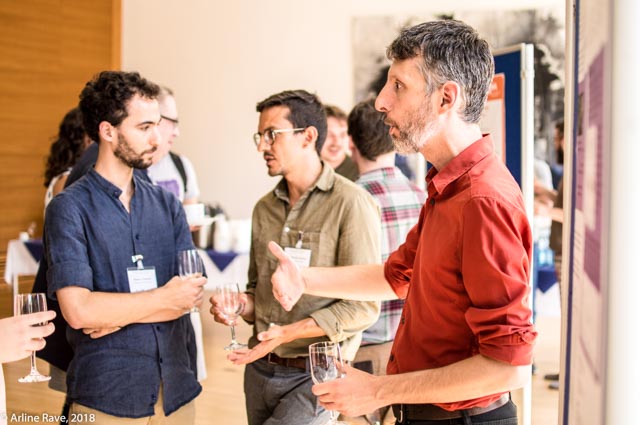 The first BIGSSS-Computational Social Science Summer School on Conflicts took place at Constructor University. 33 junior and 19 senior scientists from eleven countries discussed a variety of aspects of conflict research and started their own projects applying computational methods on conflict research topics.
The first BIGSSS-Computational Social Science Summer School on Conflicts took place at Constructor University. 33 junior and 19 senior scientists from eleven countries discussed a variety of aspects of conflict research and started their own projects applying computational methods on conflict research topics.
The summer school series follows the idea of a research incubator which brings together experts in computational social sciences (CSS), experts on the research topic in question, and junior researchers to advance future research on the topic by using data-driven modeling approaches. To implement this idea, an innovative concept was developed for the summer school in which junior researchers team up with senior experts to work through the whole research process on one specific research topic.
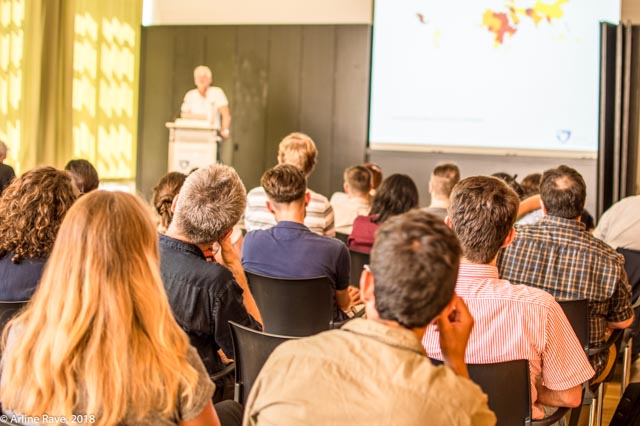 During a project fair at the beginning of the summer school, students had the opportunity to talk to all experts and sign up for one of the eight research projects. For the following two weeks they intensely worked in small groups guided by the respective projects experts on the topic they had signed up for. All project teams continued working on their research after the summer school. Their results will be published in an edited volume.
During a project fair at the beginning of the summer school, students had the opportunity to talk to all experts and sign up for one of the eight research projects. For the following two weeks they intensely worked in small groups guided by the respective projects experts on the topic they had signed up for. All project teams continued working on their research after the summer school. Their results will be published in an edited volume.
Junior and senior scientists worked together within the following projects:
- Peter Holtz (Leibniz-Institut für Wissensmedien) and Henrik Dobewall (University of Helsinki, Finland): Values in everyday language and inter-group conflict
- Davide Natalini (Anglia Ruskin University, UK), Bruce Edmonds (Manchester Metropolitan University, UK) and Adalbert Wilhelm (Constructor University & BIGSSS): Socio-ecological tipping points. Quantifying the link between environmental and climate change and conflict
- Luis Gustavo Nardin (Brandenburg University of Technology) and Gerd Wagner (Brandenburg University of Technology): Simulating the Economic Impacts of Mafia
- Fariba Karimi (GESIS Leibniz Institute for the Social Sciences) & Julian Kohne (GESIS Leibniz Institute for the Social Sciences): The role of homophily in the emergence of social norms within social networks
- Sebastian Schutte (University of Konstanz), Karsten Donnay (University of Konstanz) and James Kitts (University of Massachusetts, USA): Analyzing conflict dynamics at the event-level
- Adam Pah (Northwestern University, USA), Nicolas Payette (Laboratory for Agent-Based Social Simulation, Italy) and Juan Masullo Jiménez (Constructor University & BIGSSS): The timing and execution of terrorist attacks. The impact of city dynamics, inter-group learning and state opposition
- Fabian Flöck (GESIS Leibniz Institute for the Social Sciences) and Arnim Bleier (GESIS Leibniz Institute for the Social Sciences): Between Cooperation and Conflict. Modeling Fine-Grained Textual Revision Changes as Social Interactions
- Jan Lorenz (Constructor University), Ahmadreza Asgharpourmasouleh (University of Mashad, Iran) and Masoud Fattahzadeh (University of Mashad, Iran): Emergence of the Image of Social Conflict in Social Media
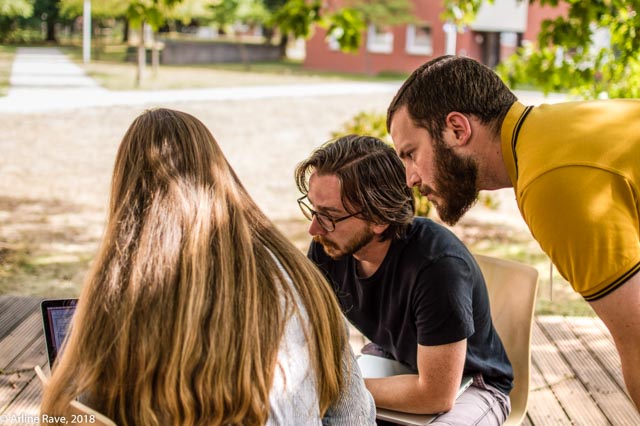 The project work was complemented by plenary lectures on theory, concepts and methods of conflict research and computational social sciences methods as well as an optional pre-summer school workshop on the programming language and statistical software package R. Keynote speeches were held by Kristian Skrede Gleditsch (University of Essex), Nils Weidmann (Univeristy of Konstanz) and Michael Ward (Duke University). Further program components included a panel discussion on the role of gender in academia and computational social sciences. The summer school was accompanied by an interesing social program including a guided city tour, BBQs, a visit of the music and cultural festival “Breminale” and a tour through the memorial "Denkort Bunker Valentin" - the second largest above ground bunker in Europe and former submarine factory of the German Nazi regime.
The project work was complemented by plenary lectures on theory, concepts and methods of conflict research and computational social sciences methods as well as an optional pre-summer school workshop on the programming language and statistical software package R. Keynote speeches were held by Kristian Skrede Gleditsch (University of Essex), Nils Weidmann (Univeristy of Konstanz) and Michael Ward (Duke University). Further program components included a panel discussion on the role of gender in academia and computational social sciences. The summer school was accompanied by an interesing social program including a guided city tour, BBQs, a visit of the music and cultural festival “Breminale” and a tour through the memorial "Denkort Bunker Valentin" - the second largest above ground bunker in Europe and former submarine factory of the German Nazi regime.
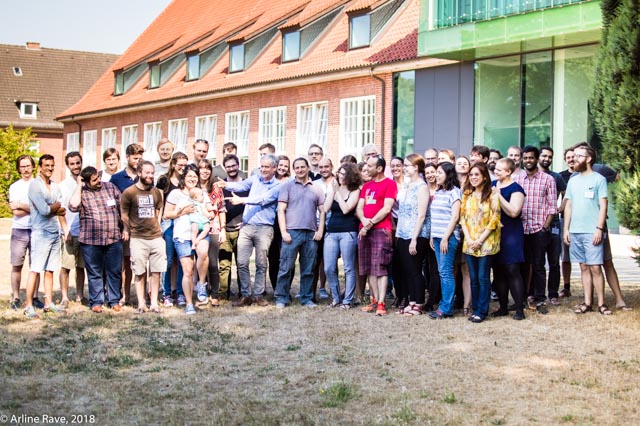 Experts and participants were convinced by the innovative concept of the summer school. Many junior scientists highlighted the summer school's concept of hands-on project work giving them the opportunity to immediately apply what they have learned and to closely work together with some well-known experts. James Kitts, one of the project leaders, admitted that he thought "it was a bit crazy to think that people could really get into a research project in such a short time” but eventually he was amazed by the progress of the projects and said that the summer school was a “fantastic event”. Bruce Edmonds, a project leader too, enjoyed the flexibility of the program giving him the opportunity to learn something from his junior colleagues.
Experts and participants were convinced by the innovative concept of the summer school. Many junior scientists highlighted the summer school's concept of hands-on project work giving them the opportunity to immediately apply what they have learned and to closely work together with some well-known experts. James Kitts, one of the project leaders, admitted that he thought "it was a bit crazy to think that people could really get into a research project in such a short time” but eventually he was amazed by the progress of the projects and said that the summer school was a “fantastic event”. Bruce Edmonds, a project leader too, enjoyed the flexibility of the program giving him the opportunity to learn something from his junior colleagues.
______________________________
Life Course
March 12th - 18th, 2018 | Bremen | BIGSSS-LIVES Winter School
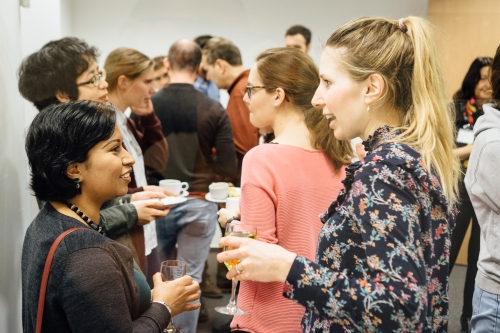 The BIGSSS-LIVES Winter School on "Life Course" took place on March 12-18 at BIGSSS. 19 PhD and Postdoctoral scientists from thirteen countries devoted themselves to current questions in Life Course Research. Methodological, theoretical and empirical considerations were at the center of two workshops organized in cooperation with the Swiss National Center of Competence in Research – LIVES:
The BIGSSS-LIVES Winter School on "Life Course" took place on March 12-18 at BIGSSS. 19 PhD and Postdoctoral scientists from thirteen countries devoted themselves to current questions in Life Course Research. Methodological, theoretical and empirical considerations were at the center of two workshops organized in cooperation with the Swiss National Center of Competence in Research – LIVES:
- Workshop on "Social networks, social participation and life transitions: a life course perspective": Organized by Prof. Eric Widmer (Geneva University), Prof. Karin Wall and Dr. Rita Gouveia (Lisbon University), this workshop explored the interplay between life transitions and changes in personal networks and social participation. The empirical study of the complex interplay between life transitions and social networks and social participation used novel longitudinal datasets.
-
Workshop on"How do values and political orientations develop across the life-span?": Organized by Prof. Klaus Boehnke (Constructor University), Dr. Regina Arant (Constructor University) and Prof. Maria Pavlova (University of Vechta), this workshop provided a context for drafting different paper topics which were successfully formulated during the workshop. Core questions addressed in this workshop were: Is it really the case that people’s value preferences are more or less stable once people have become of age? Is the old folk wisdom really true that people become politically ever more conservative, the older they get? How does early-life political activism affect later-life psychosocial well-being?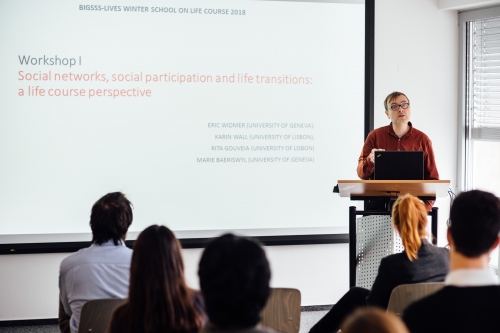
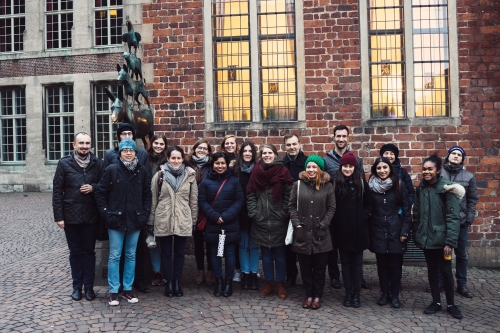
Participants who enjoyed close supervision and worked in small groups also had a chance to present their own research project and receive feedback from the instructors. Leisure activities were also included in the schedule. After a guided tour of the Bremen City, participants got familiar with its neighboring areas and cultural heritage. They learned about the history of migration in Germany in Deutsche Auswandererhaus and had a walking tour of Worpswede and its numerous art museums. In the evening they had a special dinner in Café Worpswede with a surprise three meal course.
______________________________
Interest Group Politics
June 29th - July 7th, 2017 | Bremen | ECPR Summer School
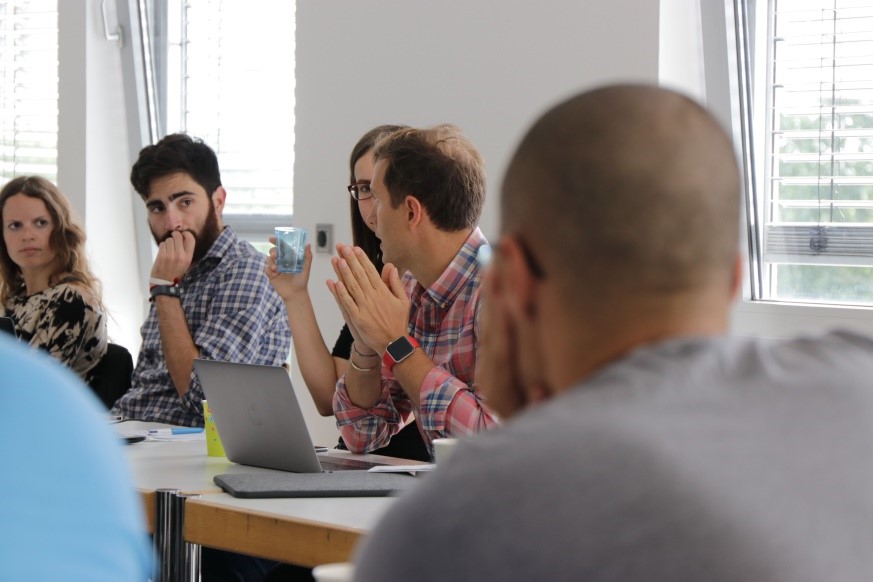 The summer school on “8th ECPR Interest Group Politics” took place from June 29th until July 7th at the Bremen International Graduate School of Social Sciences (BIGSSS). 14 participants - two research master students & twelve PhD students – from twelve universities and eight different countries participated in the program.
The summer school on “8th ECPR Interest Group Politics” took place from June 29th until July 7th at the Bremen International Graduate School of Social Sciences (BIGSSS). 14 participants - two research master students & twelve PhD students – from twelve universities and eight different countries participated in the program.
The six morning sessions of the event were dealing with different aspects of interest group organization and interest group lobbying in modern policy making (lobbying ressources and strategies, interest group populations and mobilization; professionalization of interest groups; influence of interest groups; interest groups in EU multilevel politics; public opinion and interest group mobilization), while in the afternoon we were covering research designs that allow empirical investigations of these aspects (sampling strategies; identification of group populations; quantitative surveys and qualitative interviews; quantitative text analysis; comparative case studies; social media data). During a second afternoon session, participants presented their own research and research proposals which were then discussed by faculty and participants.
 On one morning we had a panel discussion with three interest group representatives working – or having worked for groups active in different sectors. Dr. Marzena Kloka-Kohnen shared her experience as employee of the German steel industry federation, while Stefan Oeltjenbruns shared his insights as vice-chairman of the Airbus works council and active member of the German metal workers union (IG Metall). Agnes Tkotz provided us with insights from the work of the internationally active public interest group Human Rights Watch. On the afternoon of that same day we had a tour of Bremen’s historic center and the historic town hall and used the time at a local bowling center to relax and chat.
On one morning we had a panel discussion with three interest group representatives working – or having worked for groups active in different sectors. Dr. Marzena Kloka-Kohnen shared her experience as employee of the German steel industry federation, while Stefan Oeltjenbruns shared his insights as vice-chairman of the Airbus works council and active member of the German metal workers union (IG Metall). Agnes Tkotz provided us with insights from the work of the internationally active public interest group Human Rights Watch. On the afternoon of that same day we had a tour of Bremen’s historic center and the historic town hall and used the time at a local bowling center to relax and chat.
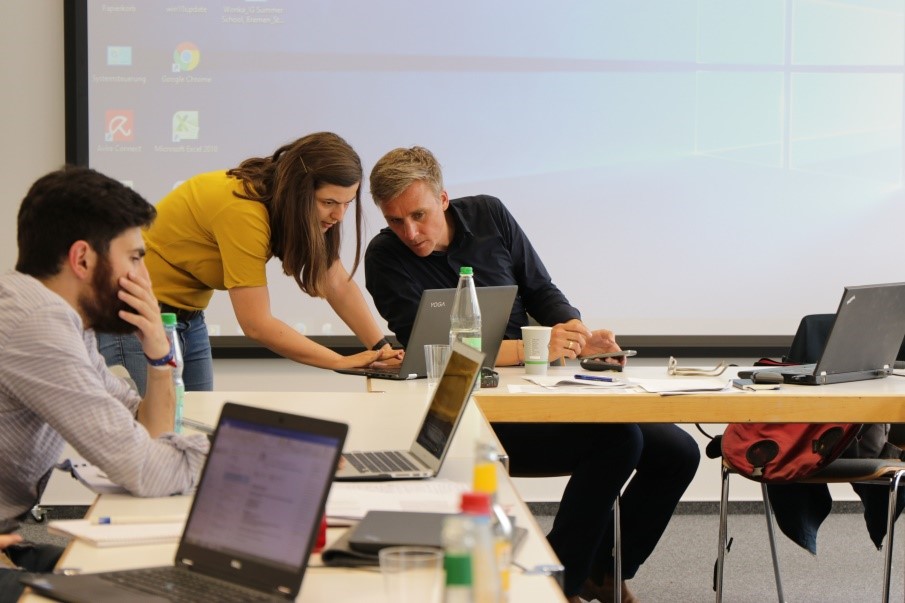 Based on the feedback we received from the participants also during the social dinner during the penultimate evening of the event, the summer school was a great success. The BIGSSS provided an excellent infrastructure (and experience from previous summer schools), the academic program was very well received and so were the individual lectures as well as the feedback sessions on participants’ research and research proposals.
Based on the feedback we received from the participants also during the social dinner during the penultimate evening of the event, the summer school was a great success. The BIGSSS provided an excellent infrastructure (and experience from previous summer schools), the academic program was very well received and so were the individual lectures as well as the feedback sessions on participants’ research and research proposals.
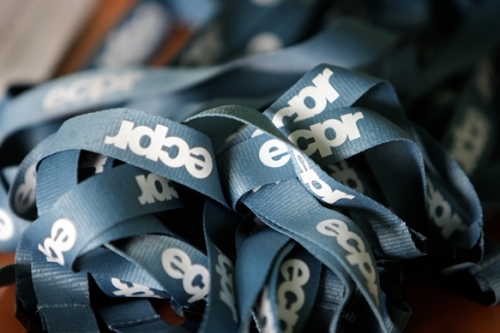 The summer school was convened by Dr. Arndt Wonka (BIGSSS/University of Bremen) and Prof. Anne Rasmussen (Copenhagen University), who also headed a one-day session each, and organized by Arndt Wonka. The following colleagues joined us to work with the participants during one day of our academic program: Dr. Marcel Hanegraaff (University of Amsterdam), Prof. William Maloney (Newcastle University), Prof. Dr. Heike Klüver (Humboldt-University Berlin), Prof. Dr. Rainer Eising (Ruhr-University Bochum), Dr. Bert Fraussen (Leiden University).
The summer school was convened by Dr. Arndt Wonka (BIGSSS/University of Bremen) and Prof. Anne Rasmussen (Copenhagen University), who also headed a one-day session each, and organized by Arndt Wonka. The following colleagues joined us to work with the participants during one day of our academic program: Dr. Marcel Hanegraaff (University of Amsterdam), Prof. William Maloney (Newcastle University), Prof. Dr. Heike Klüver (Humboldt-University Berlin), Prof. Dr. Rainer Eising (Ruhr-University Bochum), Dr. Bert Fraussen (Leiden University).
______________________________
Social Cohesion in a World of Increasing Diversity
June 25 - July 1, 2017 | Bremen | in cooperation with Bertelsmann Stiftung
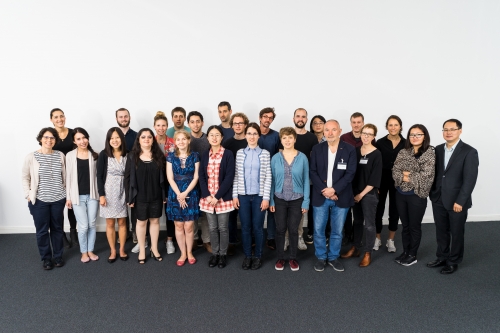 From June 25 until July 1, 2017 17 Master and PhD students from all over the world took part in a joint summer school on “Social Cohesion in a World of Increasing Diversity” organized by BIGSSS and Bertelsmann Stiftung.
From June 25 until July 1, 2017 17 Master and PhD students from all over the world took part in a joint summer school on “Social Cohesion in a World of Increasing Diversity” organized by BIGSSS and Bertelsmann Stiftung.
The focus of this year’s summer school was on the interplay between social cohesion and cultural, ethnic, and religious plurality in times of societal transformations and increasing migration flows around the globe.
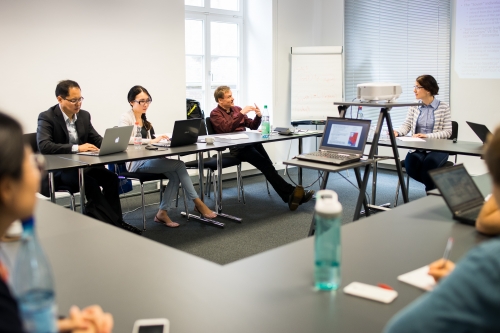 During the seven days of the summer school, participants had the opportunity to assess and discuss the impact of socio-structural, institutional, political as well as individual factors on social cohesion at different levels of societal organization. The summer school was structured around (1) presentations and discussions of participants’ own research projects and (2) presentations by guest lectures. In addition to our BIGSSS faculty members, international scholars were invited to participate in the program: Prof. Dr. Claire Wallace (University of Aberdeen), Dr. Germ Janmaat (University College London), Dr. Damir Esenaliev (SIPRI), Prof. Dr. Peter Schmidt (Justus-Liebig-Universität Gießen) and Prof. Dr. Jan Delhey (Otto-von-Guericke-Universität Magdeburg). This allowed participants to experience a stimulating scientific environment that offered them the opportunity to actively engage in discussions with a multidisciplinary international and Bremen faculty as well as other MA and PhD students working on similar issues.
During the seven days of the summer school, participants had the opportunity to assess and discuss the impact of socio-structural, institutional, political as well as individual factors on social cohesion at different levels of societal organization. The summer school was structured around (1) presentations and discussions of participants’ own research projects and (2) presentations by guest lectures. In addition to our BIGSSS faculty members, international scholars were invited to participate in the program: Prof. Dr. Claire Wallace (University of Aberdeen), Dr. Germ Janmaat (University College London), Dr. Damir Esenaliev (SIPRI), Prof. Dr. Peter Schmidt (Justus-Liebig-Universität Gießen) and Prof. Dr. Jan Delhey (Otto-von-Guericke-Universität Magdeburg). This allowed participants to experience a stimulating scientific environment that offered them the opportunity to actively engage in discussions with a multidisciplinary international and Bremen faculty as well as other MA and PhD students working on similar issues.
In addition to the academic part, two field trips were part of the program to get a hands-on experience of the topic. The first excursion was to a refugee camp in Bremen-Schönebeck. The second excursion was a neighborhood tour through Bremen Gröpelingen.
The highlight of the summer school was the public panel discussion with invited guests from politics, media, and science. Among the guests were Dr. Kai Unzicker (Senior Project Manager, Bertelsmann Stiftung), Silke Hellwig (Chief Editor, Weser Kurier), Jan Fries (State Council, Bremen) und Prof. Dr. Klaus Boehnke (Vice Dean, BIGSSS).
Watch the BIGSSS-Bertelsmann Summer School film on Social Cohesion in a World of Increasing Diversity on Youtube!
______________________________
Intergroup Conflict and Its Resolution - the Case of Ukraine
June 27-July 2, 2016 | Bremen | in coopertation with DAAD
From June 27th until July 2nd, BIGSSS hosted this year's Summer School on "Intergoup Conflict and Its Resolution - The Case of Ukraine" at Constructor University Campus.
The Summer School is a joint initiative between Kiev’s Institute of International Relations (Taras Shevchenko University), Bremen’s Research Centre for East European Studies and BIGSSS. The BIGSSS Summer School 2016 was fully funded by the German Academic Exchange Service (DAAD) and the German Federal Foreign Office (AA).
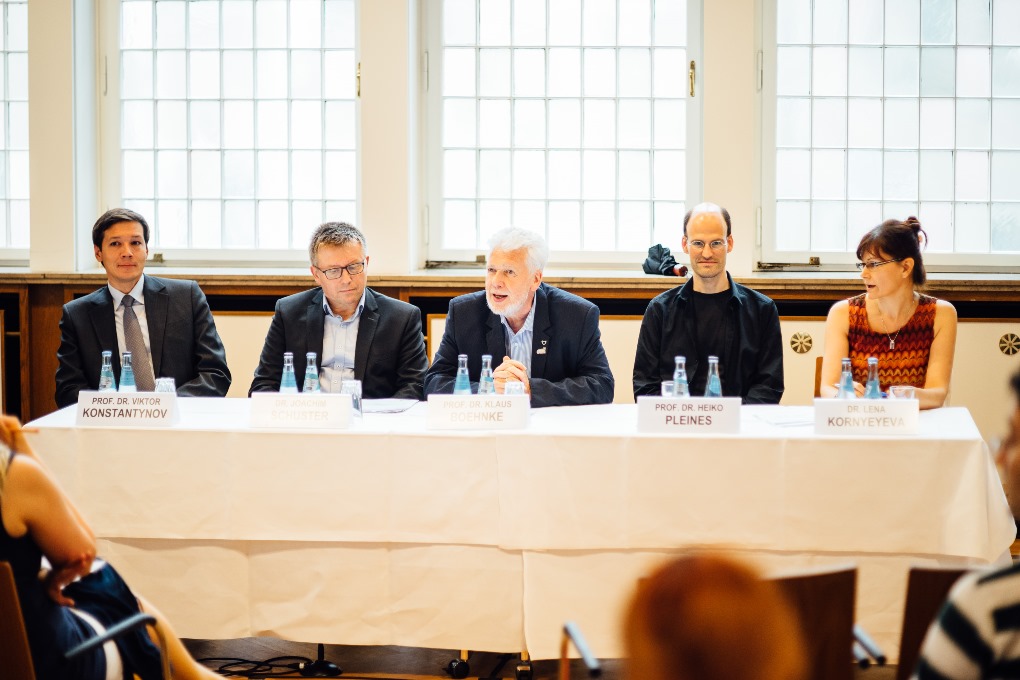 During the six-day Summer School program, 20 young social science scholars from Armenia, Azerbaijan, Georgia, Moldova, Poland, Turkey and Ukraine had the chance to meet face-to-face, to network, and to participate in academic exchange on their research projects under the guidance of our experienced Summer School faculty and external experts.
During the six-day Summer School program, 20 young social science scholars from Armenia, Azerbaijan, Georgia, Moldova, Poland, Turkey and Ukraine had the chance to meet face-to-face, to network, and to participate in academic exchange on their research projects under the guidance of our experienced Summer School faculty and external experts.
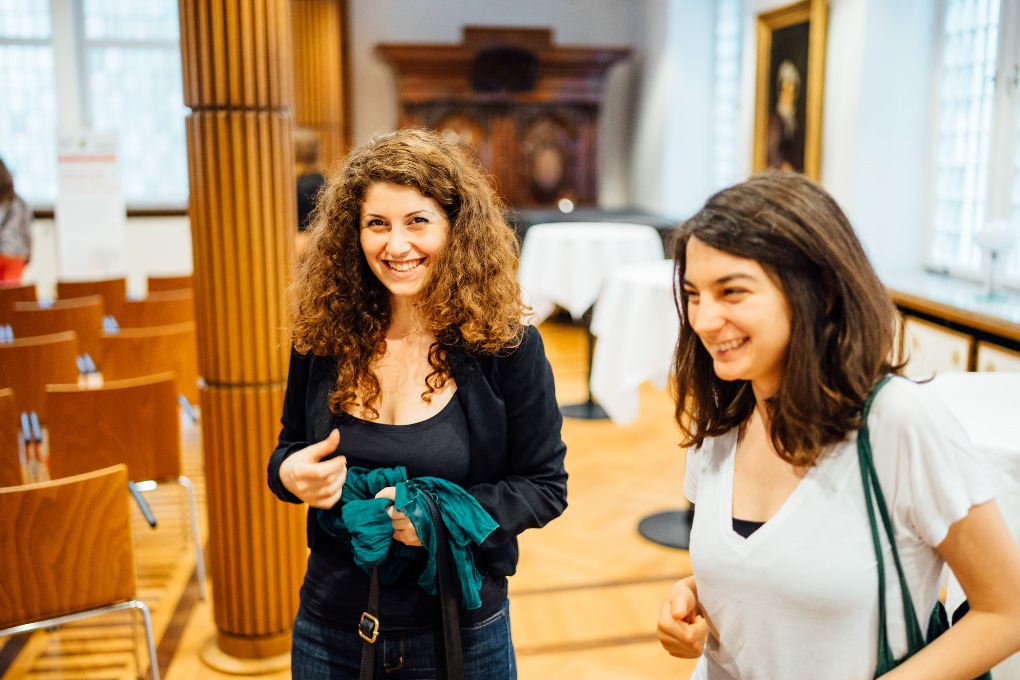 As in previous years, the summer school program was structured around the core elements of (1) presentations by guest lecturers followed by discussions and (2) presentations and discussion of participants‘ own projects. Participants benefited from exceptional academic conditions: they enjoyed a rare multidisciplinary get-together of political scientists, sociologists, and historians with psychologists who work on intergroup conflict and are typically not part of the academic discourse on the violence in the Donbas region. The Summer School thus aimed at generating a better understanding of the Ukrainian conflict as well as Ukrainian society and politics at large, and at deepening the participants' insight into the complexity of intergroup conflicts and their resolution.
As in previous years, the summer school program was structured around the core elements of (1) presentations by guest lecturers followed by discussions and (2) presentations and discussion of participants‘ own projects. Participants benefited from exceptional academic conditions: they enjoyed a rare multidisciplinary get-together of political scientists, sociologists, and historians with psychologists who work on intergroup conflict and are typically not part of the academic discourse on the violence in the Donbas region. The Summer School thus aimed at generating a better understanding of the Ukrainian conflict as well as Ukrainian society and politics at large, and at deepening the participants' insight into the complexity of intergroup conflicts and their resolution.
Besides the BIGSSS faculty members who chaired the group sessions in which participants presented their own projects, renowned guest speakers inspired the participants with insights into their own works: Viktor Konstantynov (IIR, Kyiv, Ukraine), James J. Liu (Massey University Auckland, New Zealand), Thomas Leithäuser (University of Bremen, Germany), Andreas Heinemann-Grüder (University of Bonn, Germany), Karina C. Korostelina (George Mason University, Washington DC, USA).
______________________________
The Welfare State and Inequality
June 30-July 10, 2015 | Bremen | in cooperation with Volkswagen Stiftung & DAAD
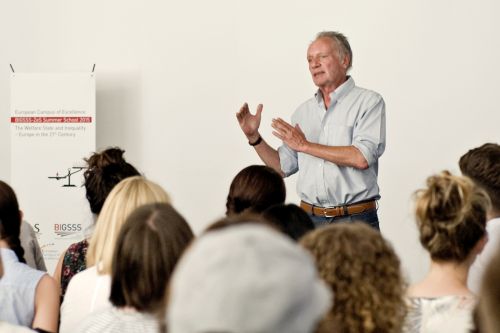 In 2015, BIGSSS and ZeS hosted the Summer School on "The Welfare State and Inequality – Europe in the 21st Century". The summer school was part of the European Campus of Excellence program. It was co-funded by the Volkswagen Foundation, the German Academic Exchange Service (DAAD) and the Mercator Foundation. The aim of the ECE Summer School was to support young social scientists by opening a cross-border dialogue on current theoretical questions and methodological approaches to questions of inequality in European welfare states in the 21st century.
In 2015, BIGSSS and ZeS hosted the Summer School on "The Welfare State and Inequality – Europe in the 21st Century". The summer school was part of the European Campus of Excellence program. It was co-funded by the Volkswagen Foundation, the German Academic Exchange Service (DAAD) and the Mercator Foundation. The aim of the ECE Summer School was to support young social scientists by opening a cross-border dialogue on current theoretical questions and methodological approaches to questions of inequality in European welfare states in the 21st century.
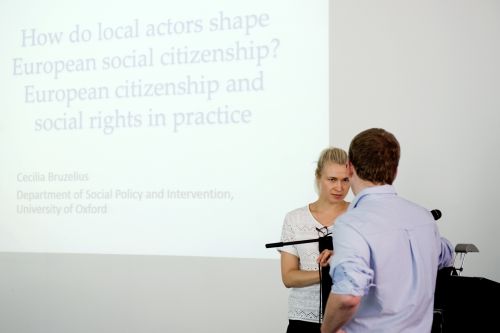 In the course of the 20th century the welfare state became a crucial structural feature for Europe’s modern democratic societies. Its social policies not only cushioned, compensated, and counteracted all kinds of social risks but also advanced societal integration and provided for people’s participation to a degree hitherto unknown. Yet, this welfare state expansion rested upon economic, social, and political conditions which have profoundly changed over the last decades. Three aspects, in particular, are of utmost importance for successfully dealing with these welfare state challenges and thus constituted the core topics of the ECE summer school 2015:
In the course of the 20th century the welfare state became a crucial structural feature for Europe’s modern democratic societies. Its social policies not only cushioned, compensated, and counteracted all kinds of social risks but also advanced societal integration and provided for people’s participation to a degree hitherto unknown. Yet, this welfare state expansion rested upon economic, social, and political conditions which have profoundly changed over the last decades. Three aspects, in particular, are of utmost importance for successfully dealing with these welfare state challenges and thus constituted the core topics of the ECE summer school 2015:
- DYNAMICS OF INEQUALITY
- OLD AND NEW SOCIAL RISKS
- SOCIAL INVESTMENT IN EUROPE
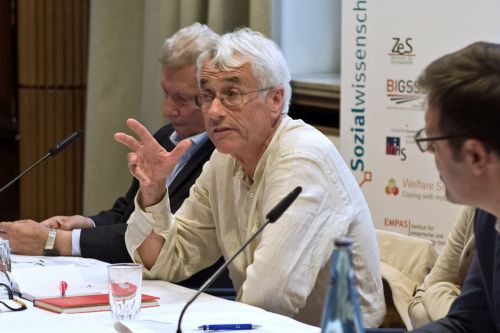 During the 10 days of the summer school program, an international and academically excellent group of 30 advanced M.A. and Ph.D. students (from the USA, South Korea, Chile, Switzerland, Portugal, Italy, Germany, Austria, Finland, Greece, Sweden, Belgium and the Netherlands) with a social science background discussed these issues with renowned scholars of the field. As in 2014, the summer school program was structured around three core elements: (1) presentations by guest lecturers, (2) discussions of selected key readings with the guest lecturers, (3) presentations and discussion of participants‘ own projects. Participants benefited from exceptional academic conditions: they enjoyed the stimulating environment of a multidisciplinary and international community of first rate scholars in the close environment of a graduate school. Besides discussing their own research projects they got in contact and networked with an outstanding faculty and met an international body of bright M.A. and Ph.D. students working in similar research fields.
During the 10 days of the summer school program, an international and academically excellent group of 30 advanced M.A. and Ph.D. students (from the USA, South Korea, Chile, Switzerland, Portugal, Italy, Germany, Austria, Finland, Greece, Sweden, Belgium and the Netherlands) with a social science background discussed these issues with renowned scholars of the field. As in 2014, the summer school program was structured around three core elements: (1) presentations by guest lecturers, (2) discussions of selected key readings with the guest lecturers, (3) presentations and discussion of participants‘ own projects. Participants benefited from exceptional academic conditions: they enjoyed the stimulating environment of a multidisciplinary and international community of first rate scholars in the close environment of a graduate school. Besides discussing their own research projects they got in contact and networked with an outstanding faculty and met an international body of bright M.A. and Ph.D. students working in similar research fields.
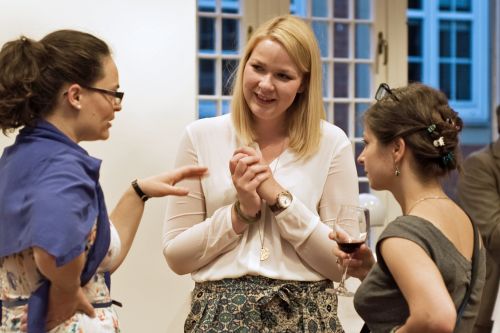 Besides the BIGSSS and ZeS faculty members who chaired the group sessions in which participants presented their own projects, renowned guest speakers inspired the participants with insights into their own works: Gösta Esping-Andersen (Barcelona), Mike Savage, (London), Giuliano Bonoli (Lausanne), Colin Crouch (Warwick), Steffen Mau (Berlin), Richard Hauser (Frankfurt a. Main), Anton Hemerijck, (Amsterdam), Michelle Jackson (Stanford), Bruno Palier (Paris), Karen Anderson (Southampton); Angela M. O'Rand (Durham), Elke Heins (Edinburgh), Daniel Clegg (Edinburgh).
Besides the BIGSSS and ZeS faculty members who chaired the group sessions in which participants presented their own projects, renowned guest speakers inspired the participants with insights into their own works: Gösta Esping-Andersen (Barcelona), Mike Savage, (London), Giuliano Bonoli (Lausanne), Colin Crouch (Warwick), Steffen Mau (Berlin), Richard Hauser (Frankfurt a. Main), Anton Hemerijck, (Amsterdam), Michelle Jackson (Stanford), Bruno Palier (Paris), Karen Anderson (Southampton); Angela M. O'Rand (Durham), Elke Heins (Edinburgh), Daniel Clegg (Edinburgh).
For more impressions view our ECE Summer School Kick-Off ECE Summer School Kick-Off Film:
______________________________
Interventions
July 8-11, 2014 | Bremen
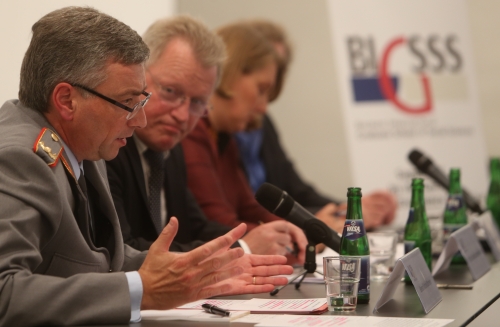 The first BIGSSS summer school on "Interventions" was an occasion for 18 advanced M.A. students and Ph.D. candidates from international universities to intensely discuss their work on interventions with a group of international scholars:
The first BIGSSS summer school on "Interventions" was an occasion for 18 advanced M.A. students and Ph.D. candidates from international universities to intensely discuss their work on interventions with a group of international scholars:
Since the 1990s the theory and the practice of intervention have become some of the most heatedly debated topics (not only) in the field of International Relations. The term ‘intervention’ was understood in its broadest sense and also addressed projects in the neighboring fields of development policy and social policy. Applicants of the major disciplines of the Social Sciences were asked to relate their projects to the following three sections:
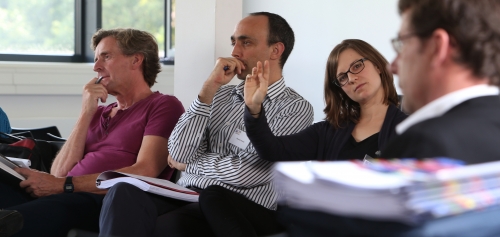 CONSTITUTING AUTHORITY
CONSTITUTING AUTHORITY
Interventions are intentional actions that try to influence other actors’ behavior. Interventions are in any case based on claims of authority by the intervener. But how are these claims constructed? What are the bases and limits of claims, when is authority acknowledged, when is it refused?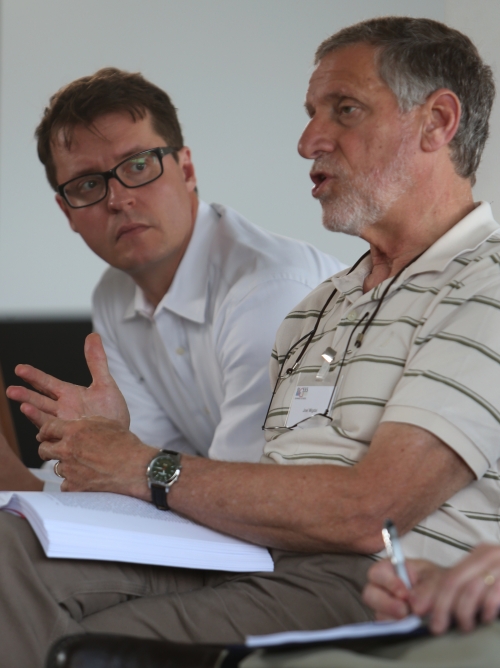 INTERVENTION BY REFORM
INTERVENTION BY REFORM
Interventions can be understood as large-scale policies that aim at transformations in social and organizational spaces. Since the 19th century, reforms have been known as one major form of such actions to transform societies at large or in particular organizational realms of it. Attempts to modernize states or the creation of welfare systems can be seen in that light. What are comparative lessons of these forms of interventions? What can we learn from these huge experiments for the contemporary discussion on interventions?- THE POWER OF INTERVENTION
Interventions consist of discourses and practices by which actors attempt to exert power. Even in unsuccessful cases, power is exerted by all parties involved. What forms of power can we distinguish here? What sort of conflicts result from clashing power games or non-coordinated actions? And what are the results of such conflicts?
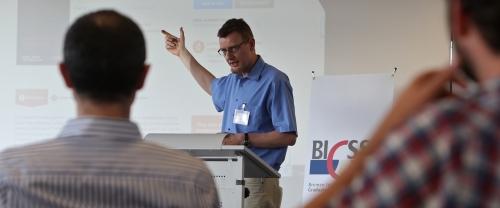 The Interventions summer school faculty consisted of: Michael N. Barnett (George Washington University), Bai Gao (Duke University), Evelyne Huber (UNC Chapel Hill), Peter Mayer (University of Bremen), Joel S. Migdal (University of Washington), Herbert Obinger (University of Bremen), Ingo Rohlfing (BIGSSS), Dominic Sachsenmaier (Constructor University), Klaus Schlichte (BIGSSS), Chris Winship (Harvard) and Arndt Wonka (BIGSSS)
The Interventions summer school faculty consisted of: Michael N. Barnett (George Washington University), Bai Gao (Duke University), Evelyne Huber (UNC Chapel Hill), Peter Mayer (University of Bremen), Joel S. Migdal (University of Washington), Herbert Obinger (University of Bremen), Ingo Rohlfing (BIGSSS), Dominic Sachsenmaier (Constructor University), Klaus Schlichte (BIGSSS), Chris Winship (Harvard) and Arndt Wonka (BIGSSS)
